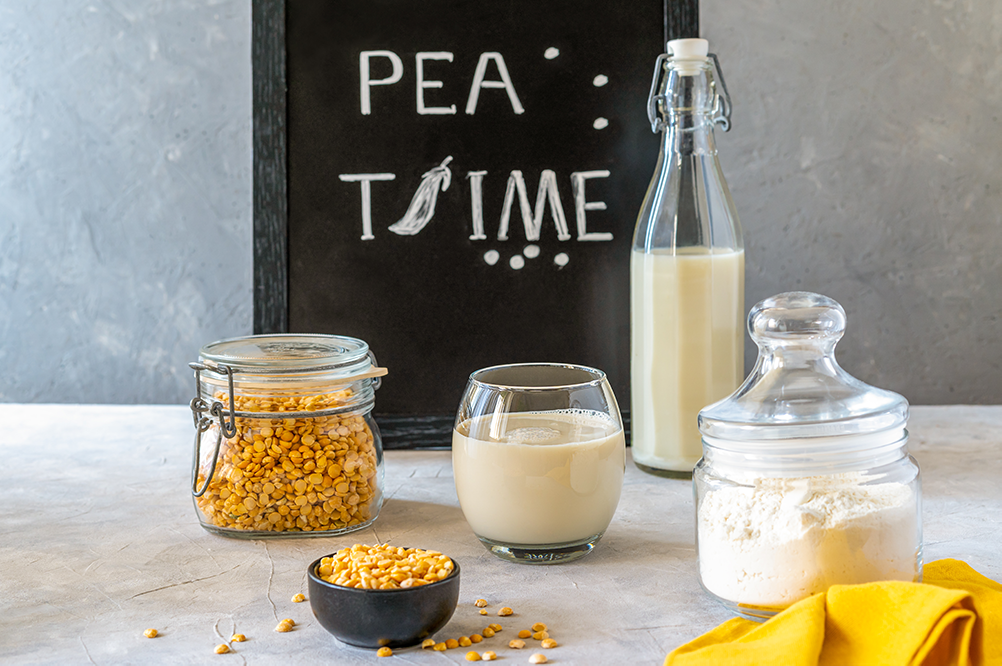WHY DO PEA PROTEIN OR PEA-DERIVED PRODUCTS TASTE LIKE...PEA?
Despite its obvious amazing nutritional benefits, pea-derived products used to be less favored by consumers of plant-based products due to its infamous beany off-flavor and bitter taste. Since the rise in popularity of pea protein as a clean vegan alternative of protein source, over the past decades many research studies have been conducted to identify the compounds responsible for the undesirable flavors/bitterness. In early 2021, a breakthrough discovery came to light, which identified the fourteen fatty acids naturally-occurring in peas that impart the characteristic off-flavor and bitter taste to pea-derived products(FAs) : 9,10,13-trihydroxyoctadec-11-enoic acid (1), 9,12,13- trihydroxyoctadec-10-enoic acid (2), 9,10,11-trihydroxyoctadec-12-enoic (3), 11,12,13-trihydroxyoctadec-9-enoic acid (4), (10E,12Z)-9- hydroxyoctadeca-10,12-dienoic acid (5), (10E,12E)-9-hydroxyoctadeca-10,12-dienoic acid (6), (9Z,11E)-13-hydroxyoctadeca-9,11-dienoic acid (7), (9E,11E)-13-hydroxyoctadeca-9,11-dienoic acid (8), 1-linoleoyl glycerol (9), α-linolenic acid (10), 2-hydroxypalmitic acid (11), 2- hydroxyoleic acid (12), linoleic acid (13), and (9Z,11E)-13-oxooctadeca-9,11-dienoic acid (14); 13 of which are unsaturated FAs.[1]
The scientists at Folona leveraged this revolutionary discovery as the foundation to develop the best-tasting Pea Milk Powder, the first and only plant-based milk made from 100% Canadian grown peas, packed with protein with a surprisingly smooth and creamy taste.
Different genotypes of field peas contain considerable variations in their lipid composition. Some have a low percentage of saturated fats per total amount of fat while some have high. With the goal of developing a Pea Milk with an emphasis on sensory favorability, we intentionally selected the genotype of field pea that contains a low percentage of the bitter-tasting unsaturated fats.
The making of Folona Pea Protein Milk Powder involves a key process called wet filtration, where proteins and lipids in the form of saturated fatty acids are separated from the starch and fiber. The separation by wet filtration works by leveraging the difference in the polarization of different compounds: Proteins and saturated fats are polarized while unsaturated fats are non-polarized.
BUT. WOULD SATURATED FATS IN FOLONA PEA MILK BE BAD FOR YOUR CHOLESTEROL?
While the amount of saturated fat in Folona Pea Milk Powder seems disproportionately high when compared to the total fat amount, one serving of Folona Pea Milk, which yields one cup when reconstituted in water, contains 3g of Saturated fat. This amount is still lower when compared to 1 cup of 2% dairy milk; however, Folona Pea Milk has an exceptionally rich, smooth and creamy sensory profile.
Moreover, not all saturated fats are bad. There is a widespread conception that saturated fatty acids in general, and palmitic acid (C16:0) in particular, are harmful in part because they elevate LDL cholesterol and atherosclerosis risk. However, dietary stearic acid (C18:0), a saturated fatty acid with an 18-carbon chain, does not increase atherosclerosis risk, and, if anything, actually reduces LDL cholesterol. [2]
The specific genotype of field peas used in Folona Pea Milk contains stearic acids as its major saturated fats. So you get to enjoy all the creaminess that the fat in our product offers while knowing that it will do good to your cholesterol levels.
Let Folona Pea Milk indulge your tastebuds while taking of your heart!
References:
[1] Glaser et al. (2021). Quantification and Bitter Taste Contribution of Lipids and Their Oxidation Products in Pea-Protein Isolates ( Pisum sativum L.). J Agric Food Chem 11;69(31):8768-8776.
[2] Senyilmaz-Tiebe et al. (2018). Dietary stearic acid regulates mitochondria in vivo in humans. Nat Commun. 2018; 9: 3129.


